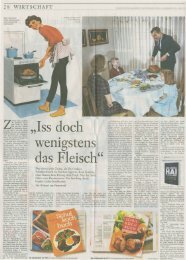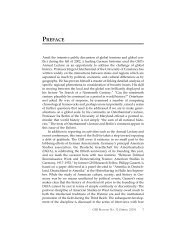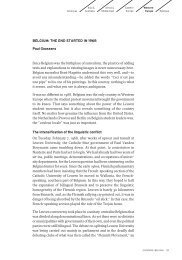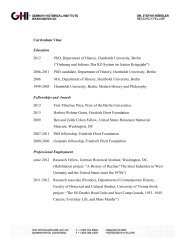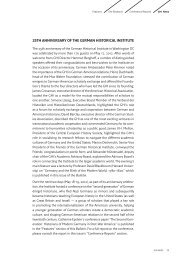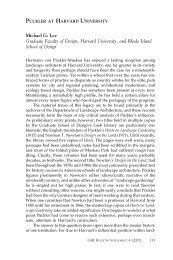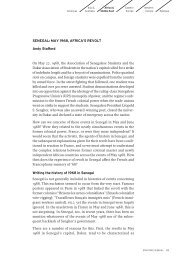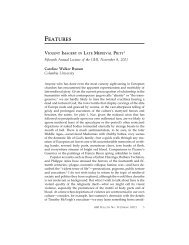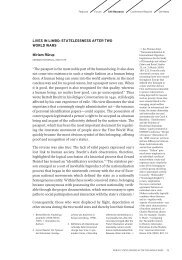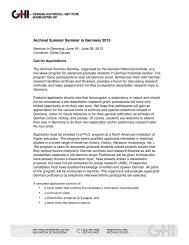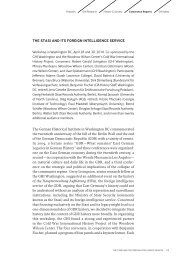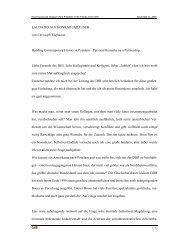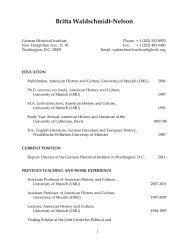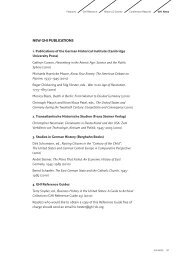German Student Exchange Programs in the United States, 1946-1952
German Student Exchange Programs in the United States, 1946-1952
German Student Exchange Programs in the United States, 1946-1952
Create successful ePaper yourself
Turn your PDF publications into a flip-book with our unique Google optimized e-Paper software.
come over and get to know <strong>the</strong> American everyday life and to see Americans<br />
all toge<strong>the</strong>r. I am to br<strong>in</strong>g a fair impression back to <strong>German</strong>y”, and<br />
she added, “to tell Americans what we are do<strong>in</strong>g <strong>in</strong> <strong>German</strong>y and what<br />
problems we have.” 24<br />
Newspaper articles generally gave two basic reasons for welcom<strong>in</strong>g<br />
<strong>the</strong> exchange participants to <strong>the</strong> <strong>United</strong> <strong>States</strong>: to teach young <strong>German</strong>s<br />
<strong>the</strong> value of democracy and to dispel <strong>the</strong>ir frequent misconceptions about<br />
Americans. There were many misconceptions, although <strong>in</strong> some cases<br />
<strong>the</strong>y derived from a simple lack of knowledge. 25 Technical terms like<br />
re-education and reorientation were hardly ever mentioned <strong>in</strong> <strong>the</strong> media<br />
coverage, nor were <strong>the</strong> reasons for <strong>the</strong> exchange program discussed. U.S.<br />
officials emphasized that <strong>the</strong> exchange programs spread knowledge<br />
about and sympathy for <strong>the</strong> <strong>United</strong> <strong>States</strong>: “It [<strong>the</strong> exchange program] is<br />
all part of <strong>the</strong> <strong>in</strong>creas<strong>in</strong>g effort on <strong>the</strong> part of this nation to be correctly<br />
‘understood’ by representatives of o<strong>the</strong>r nations which, by reason of geographic<br />
separation, may not be <strong>in</strong> position to know <strong>the</strong> motives which<br />
impel us <strong>in</strong> our <strong>in</strong>ternational diplomacy.” The article cont<strong>in</strong>ued, however:<br />
“They [<strong>the</strong> exchange students] will help our own students to understand<br />
<strong>the</strong> problems of o<strong>the</strong>r lands and to appreciate <strong>the</strong> oneness of different<br />
races and nationalities.” And on a critical note <strong>the</strong> article stated: “Then<br />
Americans would be more certa<strong>in</strong> to step lightly <strong>in</strong> o<strong>the</strong>r lands, to boast<br />
less, and to talk more of our hope for peace than of <strong>the</strong> prospect of war.<br />
If o<strong>the</strong>r peoples knew us better, we would be more sure of ourselves.” 26<br />
Although this was not specifically <strong>in</strong>tended, newspapers acknowledged<br />
that even a “one-sided” exchange <strong>in</strong>volved two parties and just as <strong>the</strong><br />
guests got to know <strong>the</strong>ir hosts, <strong>the</strong> hosts also got to know <strong>the</strong>ir guests.<br />
Many Americans were curious about <strong>the</strong> situation <strong>in</strong> Europe and political<br />
developments <strong>in</strong> <strong>German</strong>y. One college paper asked:“Would Western<br />
<strong>German</strong>y fight on <strong>the</strong> side of <strong>the</strong> U.S. <strong>in</strong> a war aga<strong>in</strong>st Russia should such<br />
a war come? What is <strong>the</strong> attitude toward <strong>the</strong> U.S. <strong>in</strong> <strong>German</strong>y? How<br />
strong is nationalism <strong>in</strong> <strong>German</strong>y?” 27<br />
The <strong>Exchange</strong>s as a Community Effort<br />
Not only curiosity awaited <strong>the</strong> participants upon <strong>the</strong>ir arrival, but whole<br />
communities planned <strong>the</strong>ir welcome. Newspaper articles testified to <strong>the</strong><br />
high degree of community <strong>in</strong>volvement <strong>in</strong> <strong>the</strong> exchange programs. Individuals,<br />
groups, town councils, local Rotary and Kiwani clubs, <strong>the</strong> American<br />
Legion, and many more participated <strong>in</strong> <strong>the</strong> preparations as well as <strong>the</strong><br />
operation of <strong>the</strong> exchange. Friends and relatives of particular <strong>German</strong><br />
students funded <strong>in</strong>dividual scholarships, but churches and <strong>in</strong>stitutions of<br />
higher education sponsored <strong>the</strong> majority of <strong>the</strong> participants. Frank Banta,<br />
Chief of <strong>the</strong> Cultural <strong>Exchange</strong> Section, noted <strong>in</strong> 1948: “Religious groups<br />
GHI BULLETIN NO. 30(SPRING 2002) 127



